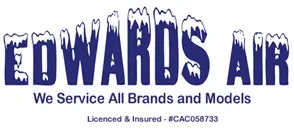
Air Conditioning Hurricane Tips
Here are some helpful tips to help protect your Air Conditioning system during and after a Hurricane.
Air conditioner prep before the storm
Getting your air conditioner ready for a hurricane isn’t super complicated, but it can save you a lot of time, money and frustration later.
Here are 3 things you should to do before the storms arrive:
Secure your AC
Do you have a split AC system with the outside unit on the ground? (Most Florida homeowners do). If so, your air conditioner should be installed on a concrete pad and bolted to the concrete with hurricane straps, as shown in the picture above.
This will help prevent the air conditioner from going airborne during a hurricane or storm.
Protect the AC’s electrical components
Hurricanes and tropical storms cause surges of power through your home. These surges can ruin your air conditioner’s important electrical components. So we highly recommend installing a surge protector for your air conditioner.
Also, turn off the AC before the storm arrives.
Cover the AC unit before the storm
Hurricanes do damage by throwing objects into other objects. So even if your air conditioner is properly secured, it can become damaged from airborne objects during a storm.
Before the storm arrives, cover your air conditioner with a tarp or homemade plywood structure to keep objects from hitting the air conditioner. (Of course, make sure to turn off the AC before covering it!)
These tips should help you minimize damage to your air conditioner during the storm. But there are a few things you should do after the storm as well.
After the storm passes
Before turning on your air conditioner, inspect it and make sure everything’s OK. Running your air conditioner with a problem can make the problem even worse.
After a storm, run through this quick checklist before starting up your AC again:
- Make sure the air conditioner wasn’t ever underwater.
- Remove the cover/tarp from the air conditioner.
- Make sure there are no signs of damage to the unit itself.
- Remove any debris that accumulated around the air conditioner.
- Make sure there is no damage to any of the refrigerant and electrical lines running from your AC.
We also recommend getting your AC checked out by a professional (especially if there are any signs of problems). Better to be safe than sorry, after all.
These tips should be combined with your other hurricane preparedness tasks to ensure you still have a working air conditioner after the storm has passed.
So call Edwards Air Conditioning today to make sure your Air Conditioner is prepared or after the storm to check the status of your system after the storm.


